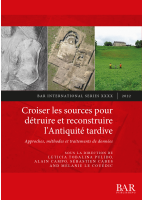Description
Cet ouvrage rassemble les actes de deux journées d'études organisées à l'Université de Pau et des Pays de l'Adour en 2019 et 2020. 18 contributions, regroupées en cinq thèmes, proposent des méthodologies innovantes pour mieux appréhender la période complexe de l'Antiquité tardive. L'objectif est de présenter des méthodologies novatrices pour mieux appréhender cette période complexe. Pour y parvenir, les différentes contributions de cet ouvrage interrogent des thématiques variées (les habitats ruraux et l'organisation des territoires, l'économie, le pouvoir et la société, le monde funéraire), dans des aires d'études diverses (Gaule, Hispanie, Lusitanie, Istrie...). Par cette approche diversifiée et interdisciplinaire, les contributeurs présentent de nouveaux horizons dans l'étude de l'Antiquité tardive et entament une importante relecture de cette période.
This book brings together the proceedings of two seminars organised at the University of Pau and the Pays de l'Adour in 2019 and 2020. 18 contributions, grouped across five themes, offer innovative methodologies to better understanding of the complex period of Late Antiquity. To achieve this, the different contributions of the book examine various themes (rural settlements and the organisation of territories, economy, power and society, the funerary world), in a variety of study areas (Gaul, Hispania, Lusitania, Istria...). Through this diverse and interdisciplinary approach, the contributors present new horizons in the study of Late Antiquity and begin an important ‘re-reading’ of this period.
EDITORS
Leticia Tobalina-Pulido est membre scientifique postdoctoral de la Casa de Velázquez et chercheuse associée au laboratoire ITEM EA 3002 de l'Université de Pau et des Pays de l'Adour. Elle est titulaire d'un doctorat en archéologie, spécialisé dans l'étude du peuplement de l'Antiquité tardive et de la modélisation spatiale.
Alain Campo est doctorant à l'UPPA et à l'UPV/EHU, associé au laboratoire IRAA-CNRS. Il est spécialisé dans la numismatique antique et du haut Moyen ge. Son doctorat porte sur une étude socio-typologique des sites entre l'Èbre et la Garonne par le biais de la monnaie et des dynamiques de la circulation monétaire entre le IIIe et le début du VIIIe s. p.C.
Sébastien Cabes enseigne l'histoire et la géographie dans le secondaire ainsi que d’histoire ancienne à l’UPPA. Il a été chercheur associé au laboratoire ITEM de 2009 à 2019, et prépare désormais une thèse à l’IRAA-CNRS portant sur “les élites rurales d’Aquitaine méridionale à l’époque romaine : espaces, environnement, société”.
Mélanie Le Couédic est docteur en archéologie et spécialisée dans l'étude des zones agro-pastorales de haute altitude depuis le haut Moyen ge. Elle s'intéresse à l'utilisation des Digital Humanities pour les données spatio-temporelles.
Leticia Tobalina-Pulido is a postdoctoral scientific member of the Casa de Velázquez and associate researcher at the ITEM EA 3002 laboratory of the University of Pau and Pays de l'Adour. She holds a doctorate in archaeology, specialising in the study of Late Antiquity settlement and spatial modelling.
Alain Campo is a doctoral student at UPPA and UPV/EHU, associated with the IRAA-CNRS laboratory. He specialises in antique and high medieval numismatics. His doctorate focuses on a socio-typological study of the sites between the Ebro and the Garonne through the currency and the dynamics of monetary circulation between the 3rd and the beginning of the 8th century AD.
Sébastien Cabes teaches history and geography in secondary school, as well as ancient history at UPPA. He was an associate researcher at the ITEM laboratory from 2009 - 2019, and is now preparing a thesis at IRAA-CNRS regarding ‘the rural elites of southern Aquitaine in Roman times: spaces, environment, society’.
Mélanie Le Couédic has a doctorate in archeology and specialises in the study of high-altitude agro-pastoral areas since the early Middle Ages. She is interested in the use of digital humanities for spatio-temporal data.
List of contributors: Laura Blanco-Torrejón, Wendy Bougraud, Sébastien Cabes, André Carneiro, David Expósito Mangas, David Fernandez-Abella, Margarita Fernandez Mier, Mario Fernández-Pereiro, Cristina Gandini, Enrique Gutiérrez Cuenca, José Ángel Hierro Gárate, Bertrand Lançon, José Ángel Lecanda Esteban, Delphine Minette, Josu Narbarte-Hernández, Christophe Pellecuer, José Carlos Quaresma, Alfonso Ramírez Contreras, Celtia Rodríguez-González, Mónica Rolo, David Serrano Ordozgoiti, Ander Rodríguez-Lejarza, Nicolás Zuazúa Wegener, Carlos Zuza Astiz.
REVIEW
‘A high quality work that brings new approaches to old and new records. I think that above all this book will open new fields in the study of territories, societies and economy in rural contexts during the Late Antique and Early Medieval periods.’ Dr Isabel Sánchez Ramos, Pablo de Olavide University











